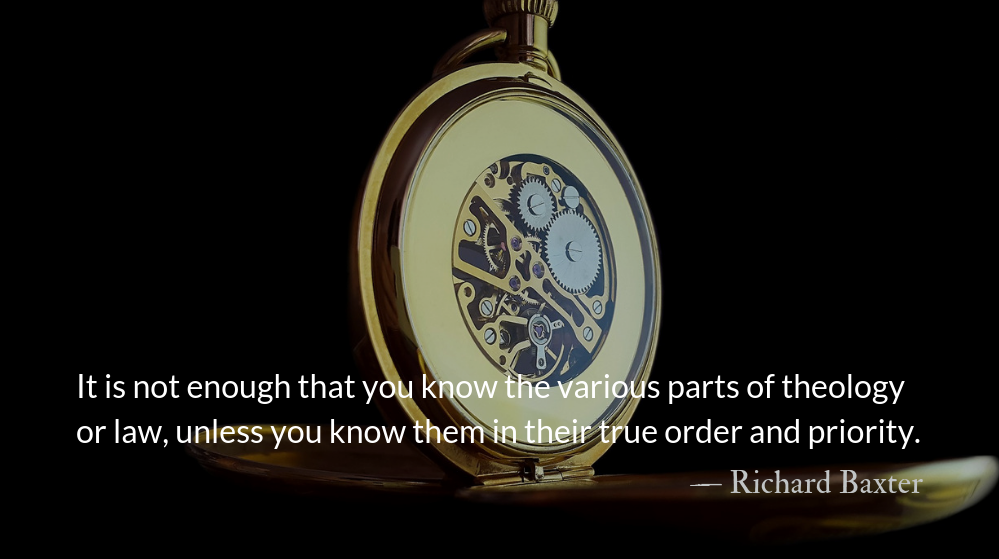Scripture: Mark 2.7, 16, 18, 24
“Why does this fellow talk like that? He’s blaspheming! Who can forgive sins but God alone?”
“Why does he eat with tax collectors and sinners?”
“How is it that John’s disciples and the disciples of the Pharisees are fasting, but yours are not?”
The Pharisees said to him, “Look, why are they doing what is unlawful on the Sabbath?”
Reflection: Theology is Like a Watch
By John Tillman
Jesus wasn’t sinless because he never broke laws. He constantly broke them.
In this one short chapter of Mark, Christ breaks (or supports those who are breaking) five separate laws (some of which were punishable by stoning): he blasphemes, he eats with ceremonially unclean people, he eschews required religious fasting, he defends working on the sabbath, he defends David’s eating of the holy bread.
Richard Baxter (1615-1691) described the interdependence of laws and truth when advising new disciples learning about theology and the scriptures for the first time:
“Truths have a dependence on each other; the lesser branches spring out of the greater, and those out of the stock and root. Some laws are but means to other laws, or subservient to them…Therefore it is one of the commonest difficulties among cases of conscience, to know which law is the greater.”
Christ recognized the priority of the greatest laws. We see this in Christ’s teaching. Jesus referred to “lesser” laws with language that exposed their second-tier authority. He often said, “your traditions,” or “Moses permitted,” or “you have heard it said…” Baxter continues:
“Upon this ground, Christ healed on the Sabbath day, and pleaded for his disciples harvesting the heads of grain, and for David’s eating the shewbread, and told them, that ‘the sabbath was made for man, and not man for the sabbath,’ and that ‘God will have mercy, and not sacrifice.’”
Baxter refers to theology as an intricate watch—meaningless unless all the parts are in proper order:
“Theology is a curious, well-composed frame. Just as it is not enough that you have all the parts of your watch or clock, but you must see that every part is in its proper place, or else it will not go, or answer its end; so it is not enough that you know the various parts of theology or law, unless you know them in their true order and priority.”
When Jesus is asked what the two greatest commandments are, his answer tells us how to set our watch by the two guideposts on which hang the entire law—Love God and love others.
*Richard Baxter selections condensed and language updated from A Christian Directory.
Prayer: A Reading
Jesus taught us, saying: “Again, you have heard how it was said to our ancestors, You must not break your oath…But I say this to you, do not swear at all…All you need say is, ‘Yes’ if you mean yes, ‘No’ if you mean no…” — Matthew 5.33-37
– Prayer from The Divine Hours: Prayers for Autumn and Wintertime by Phyllis Tickle.
Prayers from The Divine Hours available online and in print.
Today’s Readings
Genesis 31 (Listen – 7:47)
Mark 2 (Listen – 3:55)
Join Our New Facebook Group:
This weekend, in our new Facebook group for email subscribers, we will continue a series of short live videos discussing some simple, practical tools of spiritual practice using modern technology. Join the group to discuss them with us.
Follow this link to find the group. When you request to join, you will be prompted to answer questions about the email that you have used to subscribe to The Park Forum. Once we check that you are a subscriber, we will approve you to join the group.
Read more from The Heart of the Reformation
Luther’s intention wasn’t division, but renewal. The heart of the Reformation is the recovery of the gospel, inside the Church, for the good of the world.
Read more about Created Anew
The rabbis speak of “right intentions”: yetzer ha-tov (the good inclination) vs yetzer ha-ra (the evil inclination). It is possible to serve the Lord out of joy and it is possible to serve him out of duty. On the outside, acts of service appear the same: “but the Lord looks at the heart.”







